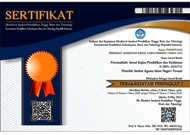Penggunaan Metode PQ4R dalam Meningkatkan Prestasi Belajar Siswa Kelas VII SMPN 1 Kandanghaur Indramayu
Abstract
Keywords
Full Text:
PDFReferences
A.M., Sardiman. (1988). Interaksi dan Motivasi Belajar dan Mengajar: Pedomanbagi Guru dan Calon Guru. Jakarta: Rajawali Press. Ali, Muhammad. (2004). Guru dalam Proses BelajarMengajar. Bandung: Sinar Baru Algensindo. Anitah, S. (1996). Penerapan Teori Elaborasi untuk Meningkatkan Perolehan Belajar. Malang: PPs UM Malang. Bodgan, Robert C. dan Biklen, S. Knopp. (1998). Qualitative Research in Education, an Introduction to Theory and Methods. Boston: Allyn and Bacon. Degeng, Sudana. (1997). Strategi Pembelajaran: Mengorganisasi Isi dengan Model Elaborasi. Djamarah, Syaiful Bahri. (1994). Prestasi Belajar dan Kompetensi Guru. Surabaya: Hamalik, Oemar. (2003). Pendekatan Baru Strategi BelajarMengajar berdasarkan CBSA. Bandung:Sinar Baru Algensindo. Harahap, Nasrun. et all. (1979). Teknik Penelitian Hasil Belajar. Jakarta: Bulan Bintang. Joni, T. Raka. (1998). Penelitian Tindakan Kelas: Beberapa Permasalahan. Bogor: PCP, PPGSM DitjenDikti.
Majid, Abdul. (2005). Perencanaan Pembelajaran: Pengembangan Standar Kompetensi Guru, Bandung: Penerbit: PT Remaja Rosdakarya. Milles, M.B. &Hubrman, A.M. (1992). Analisis Data Kualitatif. Terjemahan Tjetjep Rohendi Rohidi. Jakarta: Universitas Indonesia Press. Moeloeng, Lexi J. (1999). Metode Penelitian Kualitatif. Bandung: Penerbit: PT. Remaja Rosdakarya. Muhadjir, Noeng. (1997). Analisis dan Refleksi dalam Penelitian Tindakan Kelas. Jakarta: BP3SD Ditjen Dikti. Muhaimin. (2003). Arah Baru Pengembangan Pendidikan Islam. Bandung: Penerbit: Yayasan Nuansa Cendekia. Nur, Mohamad. (2000). Strategi-Strategi Belajar. Surabaya: Unesa Press. Rosita, T. (1992). Belajar dan Pembelajaran. Jakarta: Depdikbud. Suharsimi Arikunto. (1997). Dasar-Dasar Evaluasi Pendidikan. Jakarta: BumiAksara. Suryosubroto, B. (2002). Proses Belajar Mengajar di Sekolah. Jakarta: PT Rineka Cipta. Sutrisno. (2005). Revolusi Pendidikan di Indonesia: Membedah Metode dan Teknik Pendidikan Berbasis Kompetensi, Jogjakarta: Ar-Ruzz. Usaha Nasional.
DOI: http://dx.doi.org/10.46339/foramadiahi.v13i1.420
Refbacks
- There are currently no refbacks.
Copyright (c) 2021 Sahrudin Sahrudin

This work is licensed under a Creative Commons Attribution-NonCommercial-ShareAlike 4.0 International License.


